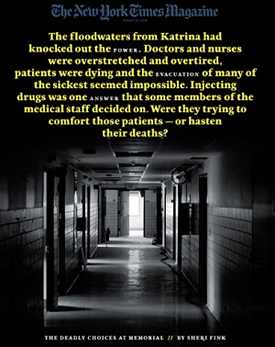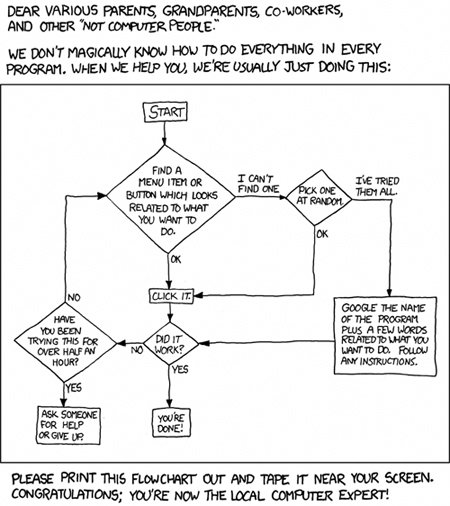[If you have time for a second pass, watch the crawler for extra fun.]
Ominous Music Heard Nationwide Suggests Danger Is Imminent!
[If you have time for a second pass, watch the crawler for extra fun.]
No genre is the new genre

This is not precisely arts related, but as particular students of human experience in our lives and work, I found it important. So if you haven’t read “Strained by Katrina, a Hospital Faced Deadly Choices” yet (which cost an estimated $400K to report, if reports can be believed [and which leads to a whole other line of discussion]), you might want to set aside your lunch hour today.
Even some 13,000 words later, I still felt that I couldn’t fully wrap my mind around what had happened at Memorial Medical Center. At the end of the article, of course, there is no grand right/wrong resolution to the choices faced and made by the people in this story, so I found myself skimming on through the reader comments, as if I might find something there. I didn’t. However, some of the comments included additional anecdotes from that time, making it clear that even after reading $400K worth of reporting, there’s always going to be more information you don’t have. And so unless you were there, and perhaps even if you were, you never really could understand a situation so complex as this.
Maybe this is the point at which we rely on art and ritual to take our hand in such matters.
Like the guilt I feel whenever I glance over at all those documentaries I got from Netflix and still haven’t watched but yet refuse to return, I also thought I was alone in my strategy for “fixing” computer issues and learning new software in absence of a house tech guy.
I was wrong.

Brought to you by the brilliant folks at xkcd.com.
I came across an interesting article in the NYTimes about the identical-twin tennis super duo, Bob and Mike Bryan. Their dad, Wayne, wrote a book on how to foster talent in children, and the article includes this quote:
In 2004, Wayne wrote a book, “Raising Your Child to Be a Champion in Athletics, Arts and Academics,” which stresses, among other things, the importance for a parent of not stealing a child’s thunder. It reads as a manifesto for a sensitive and low-pressure form of hothousing. Wayne spells out very specifically how a parent should approach his child after a match. “First, let your child come to you . . . ,” he writes. “Remember, this is her gig, not yours. You say you want to share her glory? No! Let her friends go up to her and share her moment.” And win or lose, the script is the same: First question: Do you want water or Gatorade? Second question: Where do you want to get something to eat? Third question, if the child is 16 or older: Do you want to drive or should I? “It’s really that simple,” he writes. “If the child wants to talk about the match, you listen. But don’t critique. . . . Your role is to minimize pressure, not create it.”
I thought that would be pretty good advice for the stage moms and dads out there as well, with some obvious substitutions (Do you want a soy latte or shot of bourbon?), but is there anything you do/did for your talented offspring that would add to the “minimize not create” stress mantra? I would give space to the “add more stress” option, but frankly every kid I remember meeting in those competition hallways was already stretched to the breaking point.
No matter how many orchestras they guested with, I just never found the chance to check out any Grizzly Bear. This morning, however, I can’t stop watching Gabe Askew’s fan video.
Two Weeks – Grizzly Bear from Gabe Askew on Vimeo.
When it’s 95 degrees and a million percent humidity, the only thing to love about the NYC subway system may be that inescapable space it gives you to read all the articles in the week’s New Yorker. I probably would have skipped Sasha Frere-Jones’s piece on Leonard Cohen (“State of Grace,” 9/24/09), and missed out on the chance to revisit some favorite tunes and pick up some Cohen wisdom. But it was still 30 minutes to Brooklyn and comfortably cool in the car, and so I settled in.
On Buckley’s version of “Hallelujah,” for instance, the verse melodies ascend, and the open-throated singing transforms the chorus into a kind of earnest incantation that the songwriter probably wouldn’t attempt himself. Cohen may sing about transcendence, but he seems never to fully endorse it.
Later, I dug around in the virtual cupboard and played some tracks once committed to well-worn mix tapes. For a moment I was 19 again, and then suddenly I felt so very much older.
“Young people’s attitudes to music may be too complicated and fast-changing to measure.” Read the full article.

I liked this piece mostly for what it was willing to acknowledge we don’t know about what we don’t know. Often when I read yet another article about changes in the distribution of recorded music, I tend to have a Don Quixote flashback sensation. A google search to make sure I wasn’t mixing my metaphors turned up this apt quote from the novel [as posted to wikipedia].
Just then they came in sight of thirty or forty windmills that rise from that plain. And no sooner did Don Quixote see them that he said to his squire, “Fortune is guiding our affairs better than we ourselves could have wished. Do you see over yonder, friend Sancho, thirty or forty hulking giants? I intend to do battle with them and slay them. With their spoils we shall begin to be rich for this is a righteous war and the removal of so foul a brood from off the face of the earth is a service God will bless.”
“What giants?” asked Sancho Panza.
“Those you see over there,” replied his master, “with their long arms. Some of them have arms well nigh two leagues in length.”
“Take care, sir,” cried Sancho. “Those over there are not giants but windmills. Those things that seem to be their arms are sails which, when they are whirled around by the wind, turn the millstone.”

Ever since submitting a proposal to the National Summit on Arts Journalism for NewMusicBox/Counterstream Radio, I’ve been scratching at the concept of “reinventing arts coverage” in my head. If we could close our eyes, click our heels, and start over, what would journalism about the arts look like? If we were just starting to produce it in 2009, would we still fall into the “profile and review” pattern of discourse, or would we get something radically “other” (besides the 2.0 Twitter review and the Facebook bump)? I considered taking up the Hunter S. Thompson method myself once before, and it appears some new kids on the block are going to try out The Onion approach, but as media consumers about media, what are we seriously hunting for? What do we need reported about the arts and how do we want it packaged?
Personally, when it comes to music in the specific, I guess I’m still looking for a feed of actual music (i.e. audio) that helps me sort through the avalanche of new content that flows out of the recording mines every day, but one that also stretches out further than just the coolest indie rock MP3. I’m hunting for gate keepers who can point me in particular directions (and I very much do mean that in the plural), but then I also want enough multimedia at the ready right there on the page to make a judgment call for myself (I’m trapped between paradigms and I’m not sure I want to get free yet). I don’t want complete critical autonomy, but I don’t want the alternative to require absolute buy-in to the presenter’s viewpoint either. I want surface detail to attract my attention–a teaser track, a biographical or philosophical designation–and then the option to dig in much further when something catches my interest. And “much further” need not always be defined as a chronological unpacking of an artist’s life story, either. (Where does that leave the “deep think” pieces? Somewhere inside there, but I’m just not sure what they look like.)
And so here’s my thinking: If I can log and track those interests as I discover them and keep following artists along as they create more, that’s a huge improvement from what I’m doing/getting now. If I can do all this regularly and efficiently, seamlessly and continually refreshing my music library with new picks and knowledge, even better. Now, I know there are plenty of “if you like” sites already running, but I’m asking for a trusted source to help curate mine, pare down my choices and yet make sure it keeps up its diversity. We all need a place to start, and I’d rather not start with the stuff I already know and love too much. I don’t want to miss new breakthroughs because I’m still listening to everything that sounds like Will Oldham.
Okay, I’m closing my eyes, clicking my heels, I can see it now. Wait, what? Oh, you want me to tell you how we’re going to pay for all this? Damn, I hate when dreams come with accountants and their realistic spreadsheet desires. And I doubt I could sell anyone on a subscription model in this economy.
I’m a little late to this one, but wow: My grandmother may finally care about what I do for a living.
[via Tom Service/Guardian]
And if you’re still looking for procrastination material: Unrelated to music, except in the “Q: Where were you before you moved to Williamsburg? A: Oberlin.” kind of way…
[via Dial “M” for Musicology]
If the narrative alliteration starts to grate, you can skip ahead to 1:45 for the silent show.
I admit the nerd in me wondered if we could hire them to do a choral version of 4’33”. (I should probably have kept that one to myself, huh?)
an ArtsJournal blog
